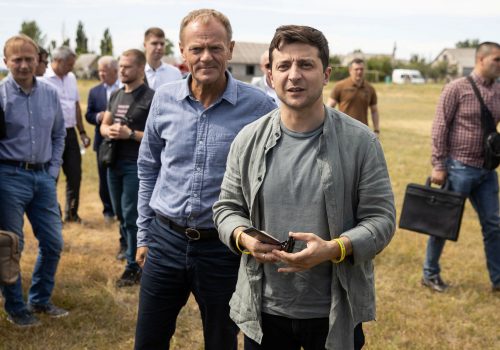Will Zelenskyy succeed?
Volodymyr Zelenskyy has been president of Ukraine for more than a month now. He has met the leaders of Canada, France, and Germany, and made a number of moves, from dismissing the parliament and calling for early elections to rebuffing Vladimir Putin’s talk of giving Russian passports to Ukrainian citizens.
In less than two weeks, Zelenskyy’s new political party is likely to sweep the July 21 parliamentary elections, giving Zelenskyy and his party unprecedented control of the presidency and the next government.
While Zelenskyy and his party look terrifically strong after trouncing the incumbent by a nearly three to one margin, the new president’s political position remains extremely fragile as he faces more challenges and pressure than his predecessors did.
First, being elected at 41, Zelenskyy became the youngest president in the country’s history with zero political experience. His career arc as an actor turned president invites parallels to US President Ronald Reagan, who was also an actor. However, Reagan had executive experience: he served two terms as California’s governor and then was elected president at 69. Reagan also had the backing of his party with a team of professionals who helped him stay in power and implement his promises. Most of Zelenskyy’s team is made up of his business partners and childhood friends from eastern Ukraine. Many lack political experience or public service, including Ihor Bakanov, head of the Security Service of Ukraine (SBU); Bakanov is a businessman who chaired the “Kvartal 95” television show which made Zelenskyy popular. This fact makes the new team vulnerable to professional politicians who have stayed in power for decades and know all shadow schemes and political tricks.
Second, the Kremlin is playing hard ball with the new administration and Zelenskyy’s team has little foreign policy experience. Early on, the Russians put hard pressure on him through a military escalation in the east and pledged to issue Russian passports to Ukrainian citizens living in the occupied parts of Luhansk and Donetsk oblasts. Now the Kremlin is threatening to cut off gas supplies to Ukraine; it points to a ten-year agreement between Naftogaz and Gazprom that is set to expire on January 1, 2020. These pressures are meant to drive Zelenskyy and his unexperienced team to make serious mistakes, which benefit the Kremlin in its confrontation against Ukraine and the West.
Third, during his official visits to Paris and Berlin last month, Zelenskyy received guarantees from its leaders, including the continuation of financial assistance from the IMF and World Bank. However, he has been denied any clear response from German Chancellor Angela Merkel about the future of Nord Stream 2, which would allow Russia to send gas to Europe directly, cutting out Ukraine entirely. Another challenge from Western partners comes from the implementation of the Minsk 2 ceasefire agreement, which includes controversial provisions that would provide amnesty to separatists, Russian mercenaries, and other military groups who took up weapons against Ukrainian regular forces in the Donbas. Pressure to implement these provisions could lead to protests inside Ukraine, especially among the opposition and veterans.
Fourth, Ukrainian oligarchs will do everything possible to brand Zelenskyy and his entourage as compromised. While Zelenskyy is trying to distance himself from his business partner Ihor Kolomoisky, Ukraine’s oligarchs who have run the country for the last twenty years will do everything possible to put their people onto Zelenskyy’s party list and into the highest positions in the next government. If Zelenskyy decides to change the rules which governed Ukrainian politics since independence, the oligarchs, including Kolomoisky, will do everything possible to seriously challenge the new president.
In his “Servant of the People” television show, Zelenskyy plays an ordinary school teacher who was unexpectedly elected president and then easily sacks most of the dead weight that his predecessors had put in place. Then the fictional president puts together a team that includes his former school colleagues who were young, honest, and passionate people. This doesn’t seem to be the case in real life, and several of Zelenskyy’s choices, including his chief of staff, have drawn deserved harsh criticism.
In many ways, Zelenskyy’s presidency embodies the “Ukrainian dream,” when a new politician and self-made showman can be elected president and slay the many bad forces that hold Ukraine back. But both external and internal risks threaten this dream.
Mykola Vorobiov is a Ukrainian journalist and a former Austrian Marshall Plan foundation fellow at Johns Hopkins University (SAIS).
Image: Ukraine's President Volodymyr Zelenskyy steps out of a helicopter as he visits Luhansk region with European Council President Donald Tusk (not pictured), Ukraine, July 7, 2019. Ukrainian Presidential Press Service/Handout via REUTERS
